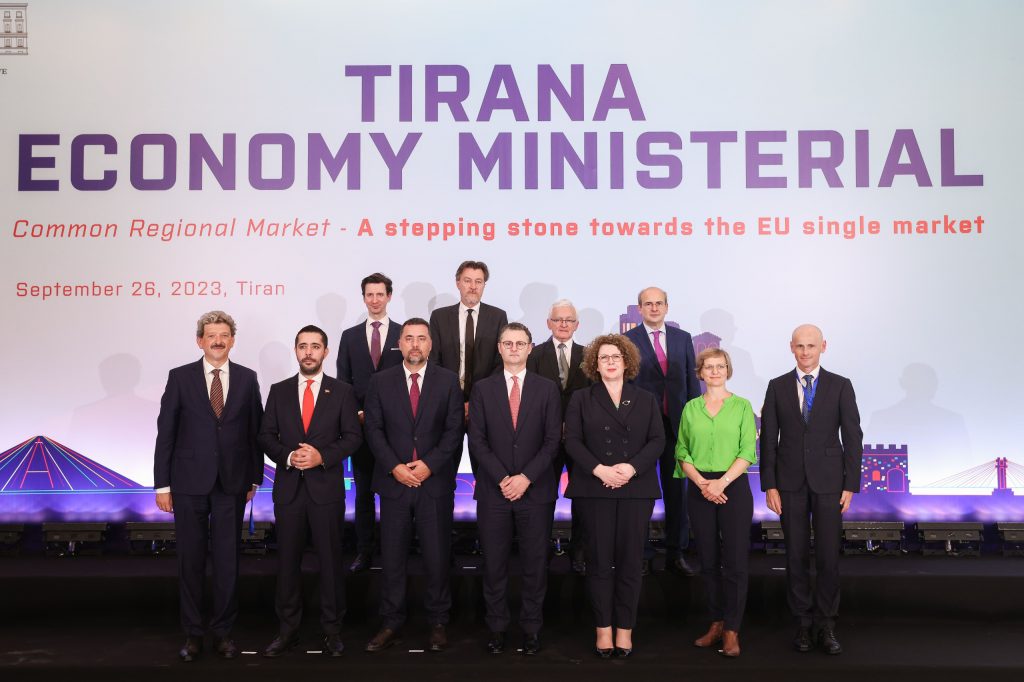The Ministers of Economy of the Berlin Process, representatives of the European Union, and other partners of the Berlin Process met in Tirana on 26 September 2023 to discuss the Common Regional Market (CRM) – a gateway to the EU Single Market.
During the Albanian Presidency of the Berlin Process and in preparation for the next Berlin Process Summit, which will take place in Tirana on 16 October 2023, the Berlin Process Economic Ministers’ Forum reflected on the achievements, priorities, and main challenges in the implementation of the Common Regional Market Action Plan. Ministers discussed the promotion of regional integration through the Berlin Process as an important instrument to accelerate the economic convergence of the region with the European Union.
The Ministers recognized that alignment with the EU internal market has been achieved through trade agreements, Stabilisation and Association Agreements, and CEFTA between the Western Balkan countries. These agreements are considered essential for the region’s economic convergence with the EU.
They expressed strong support for further economic convergence of the Western Balkans with the EU internal market through the EU enlargement process, which they saw as mutually beneficial for both the region and the EU.
Ministers called for deeper integration into individual EU programs and policies, as outlined in the EU accession negotiation methodology. They underlined the importance of the European Commission’s Economic and Investment Plan for the Western Balkans in achieving closer integration.
Ministers welcomed several initiatives to strengthen cooperation with the EU, including the CEFTA Transport Community (TCT) to facilitate border crossing, and reduce roaming costs and agreements on customs data exchange. They urged the remaining Western Balkan countries to conclude similar agreements with neighboring EU Member States.
The extension of the Trans-European Transport Network (TEN-T) to the Western Balkans was welcomed. The Ministers stressed the need to improve regional road and rail infrastructure.
Furthermore, they supported the continuation of programs such as the Regional Supplier Development Programme, which promotes SME participation in multinational supply chains, and the Regional Challenge Fund, which supports youth employment and economic growth.
Ministers welcomed a new regional development plan, announced by EU Commission President Ursula von der Leyen.
They proposed joint projects inspired by EU initiatives on digital transformation and the green agenda, such as WiFi4EU, 5G, cross-border corridors, and smart mobility. Initiatives to be included in the Western Balkans Growth Plan were discussed, including trade and transport facilitation, integration into the European Raw Materials Alliance, integration of central bank payment systems into the European system, and business development services for regional entrepreneurs.
The Common Regional Market Action Plan, based on the four freedoms of goods, services, people, and capital, was noted as a tool to facilitate economic growth and regional integration, thus making the Western Balkans more attractive for investment. Progress within CEFTA was recognized, including decisions on AEO programs, industrial products, food establishments, travel agency licenses, and qualifications for licensed professions.
Ministers proposed the establishment of a dedicated center to monitor the pace and trajectory of regional convergence. The Regional Cooperation Council (RCC) was commended for its support in implementing policy agendas within the regional common market, including the recognition of professional qualifications. The challenges in implementing the regional integration agenda were discussed, followed by the presentation of a list of commitments, to be submitted to the next Berlin Process Summit.
Recognizing the importance of payment systems, Ministers expressed support for the integration of the Western Balkans into the Single Euro Payments Area (SEPA) in order to reduce payment costs and promote economic growth. They invited CEFTA to create a similar framework for the region.
The introduction of instant payments found large support, as did the development of the Fin-Tech industry and the use of QR code-triggered payments. These measures aim to improve cross-border services and reduce the cost of payments.
All activities related to payment systems and financial market development will be coordinated within the Financial Markets Working Group of the Regional Cooperation Council, supported by the CEFTA Secretariat. These conclusions reflect the commitment of the Western Balkan countries and their partners in the Berlin Process to enhance economic integration, infrastructure development, and cooperation with the EU in order to promote economic growth and convergence with EU standards.







